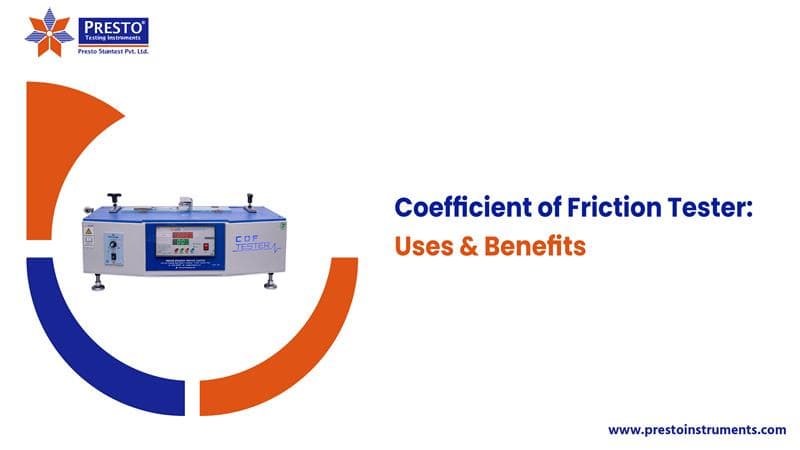
07-Nov-2025
Presto Instruments
In most industries, studying the behavior of materials in motion is crucial to the quality and performance of products. The way two surfaces slide against each other can affect packaging efficiency, product handling, and even safety during use. In order to assess these properties, special test tools are used to determine the frictional characteristics of materials in controlled conditions.
One such tool, the Coefficient of Friction (COF) Tester, is crucial in examining the characteristics of the surface, enabling manufacturers to create consistency and work with materials, as well as comply with the established standards within the industry.
A coefficient of friction tester is a laboratory instrument to test the frictional properties between two surfaces, for example, plastic films, paper, laminates, or packaging materials. It helps in determining the static and kinetic friction values which are significant for understanding material behavior during handling, stacking and transportation.
The simplest example of a coefficient of friction tester is the machine used in the packaging industry for measuring the static and kinetic coefficients of friction of plastic films.
The coefficient of friction tester is based on the principle of frictional resistance, which states that if one surface is reciprocated over another under a known load. Sample preparation, sled setup, test initiation, force recording, COF calculation and display & recording, etc, are described in detail.
Here are the steps explained:
A coefficient of friction tester is an important tool applied in various industries to measure the frictional resistance between two surfaces. Here are the uses of the coefficient of friction tester explained:
Manufacturers use COF testers as a means of ensuring materials meet a particular performance standard. In the case of packaging, a specific coefficient of friction may be required so that films or sheets can run through automated processing machines or be stacked securely without slipping during transport.
Results from testing will reveal what the best material is for a specific purpose. Products that are meant to be easily dispensed should have a low coefficient of friction; floors and footwear should have a high COF and, correspondingly, not be slippery surfaces.
Product design and optimization by COF testers involves material friction analysis to improve handling, packaging, and usability. This helps the manufacturers in selecting appropriate materials, reducing slippage, and increasing durability.
Friction values of materials are checked by manufacturers in order to prevent material slippage accidents when materials are loaded, packaged, or transported. This aims to safeguard the product from damage, reduce its occurrence, ensure handling stability, and ultimately improve workplace safety and efficiency in production and distribution.
The products are found to be compliant with respected industry standards and norms, such as ASTM D1894, ISO 8295 and TAPPI T815 used for testing films, papers and common materials. Compliance with these standards assures reliability of products, accuracy, and customer satisfaction through trust and compliance in international markets.
The Coefficient of Friction Testing Apparatus can be very useful to different industries for a number of reasons. It aids in quality assurance in manufacturing, it can help increase productivity, it can help enhance the performance of materials, and it is also useful in helping to comply with regulations.
Here are the benefits explained in detail:
The COF tester ensures material consistency of material quality by accurately measuring frictional characteristics. It provides reassurance in the fact that films, papers and packaging material have the correct slip properties to prevent sticking, tearing and slipping in the processing and also in use.
Manufacturers can improve production conditions like speed, tension, and handling through friction monitoring. This reduces downtime and waste and improves overall performance, making production and packaging smooth operations.
The tester checks for sufficient smoothness and sliding properties of a material's surface. This allows for material selection for a potential application that improves usability and performance in packaging, transportation, and customer handling.
The COF tester can help industries to guarantee compliance with the national and international testing standards such as ASTM D1894 or ISO 8295. This can help to ensure compliance with legal requirements and customer expectations, as well as to ensure that trust and confidence in the product's performance are maintained.
The coefficient of friction tester is a required tool that confirms quality checks and safety in the industry that manages soft materials. After measurement of the frictional properties, it assists the manufacturers to be consistent, comply, and provide products that work reliably in real-world conditions.
Elevate your quality assurance process to new heights
At Presto, we take pride in being Global manufacturers of Laboratory Testing Instruments for different industries.